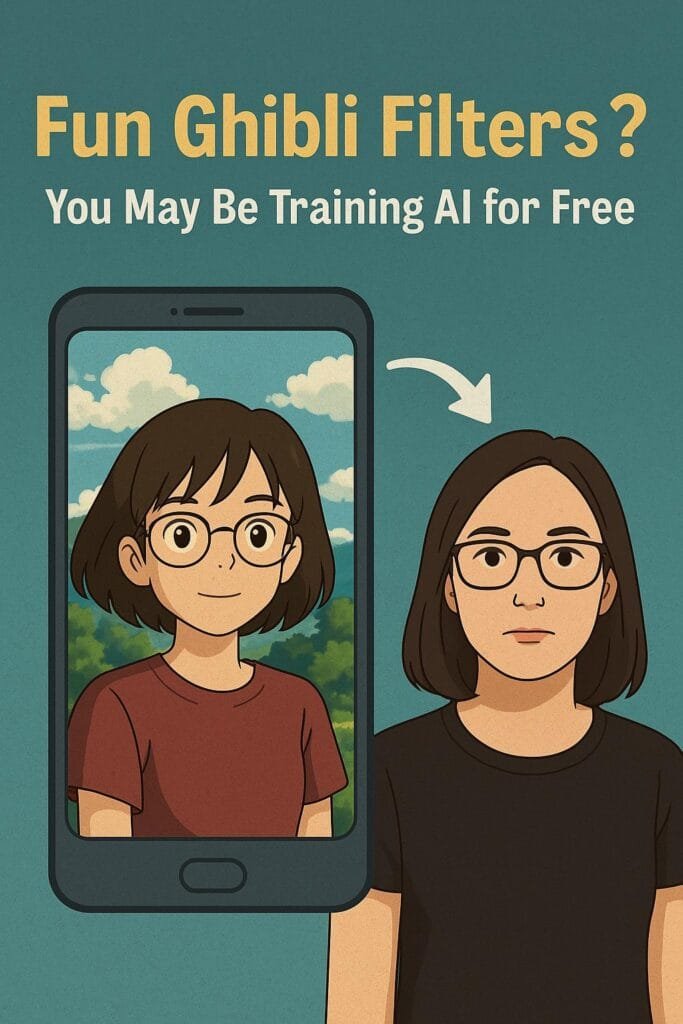
Think Ghibli AI filters are just fun? Learn how they may harvest your selfies, train AI, and risk your privacy—even if someone else uploads your image.
Ghibli-style AI selfie trends have taken over social media. These dreamy filters turn ordinary selfies into cinematic art reminiscent of Studio Ghibli films. But what seems like harmless fun may come with hidden costs. Behind the cute characters and colorful backgrounds is a serious privacy risk—your face could be used to train AI, harvested for data, or even reconstructed without your consent. Here’s what you need to know.
What Are Ghibli-Style AI Filters?
These filters use generative AI models to convert selfies into fantasy-style portraits. Popular on TikTok, Instagram, and third-party apps, these tools often use AI models like Stable Diffusion or MidJourney trained on massive datasets, sometimes including user-uploaded images.
While the final image may look animated, the AI retains and encodes many of your facial features.
What Happens to Your Selfies?
When you upload your photo:
- ✅ It’s stored on cloud servers
- ✅ It may be used to train or fine-tune AI models
- ✅ It could be shared with unknown third parties
- ✅ It may be retained even after you delete it
Your selfie can become part of the AI’s training data—without you being notified or compensated. In many cases, users unknowingly accept this through vague terms of service.
Can AI Regenerate Your Original Photo? Yes.
Here’s what most people don’t realize:
Even if only your Ghibli-style selfie is uploaded (by you or someone else), advanced AI apps can often reconstruct your original photo or a highly similar version.
How It Happens:
- Some AI platforms use reverse diffusion algorithms—which means they can “undo” the artistic effect and approximate your original face.
- These models work by recognizing the pattern of transformation and mapping it backward using previously trained facial data.
- Since your facial features are embedded in the stylized image, the AI can extract and regenerate them.
Why This Matters:
- ❗ Someone else can upload your Ghibli selfie and retrieve a realistic version of your face.
- ❗ You never gave consent, but your identity was still used.
- ❗ This opens the door to identity theft, deepfakes, or misuse of your likeness.
Major Privacy Concerns to Consider
- Lack of Transparent Consent
Most users don’t realize they’re handing over rights to their face and data. - AI Training Without Pay or Credit
Your face helps build better AI, but you get nothing in return. - Unseen Third-Party Sharing
Many filter apps share or even sell user data for marketing and analytics. - Loss of Image Ownership
Uploading your photo often means giving up rights to it. - Biometric Privacy Violations
Facial recognition data can be extracted and used without clear regulation.
Real-World Examples
- Lensa AI was criticized in 2022 for using user photos to train its AI without clearly stating it in their terms.
- FaceApp faced scrutiny for storing photos on Russian servers and unclear data usage policies.
- Stable Diffusion and similar models have been accused of scraping online content—including faces—for AI training without user consent.
Expert Warnings You Should Know
- Electronic Frontier Foundation (EFF) states: “Facial data is one of the most personal forms of biometric information and should be protected accordingly.”
- AI Ethics researchers highlight that “stylized filters are not anonymized; they often retain enough data for facial reconstruction.”
- MIT Technology Review revealed that even deleted photos can remain in AI datasets and be partially restored.
How to Stay Safe While Using AI Filters
✅ Read the Privacy Policy carefully before uploading any photo
❌ Don’t assume stylized = safe—your features are still there
✅ Use apps that clearly say your data won’t be reused
❌ Avoid apps that connect to social logins or ask for unnecessary permissions
✅ Ask: Can I opt out of AI training? If not, think twice
Final Thoughts: Think Before You Ghibli
The Ghibli AI selfie trend may feel whimsical and harmless, but the consequences can be very real. Whether you upload your photo or someone else does it using your stylized image, you may be contributing to the development of powerful AI—without your knowledge or permission.
🔐 Your face is your identity. Don’t give it away for free.

